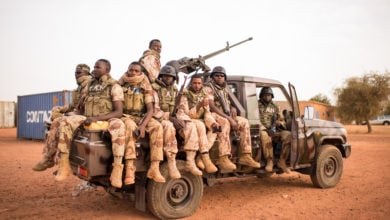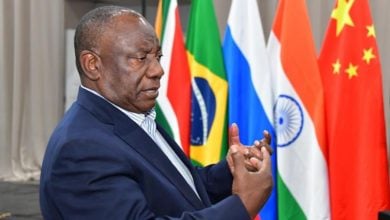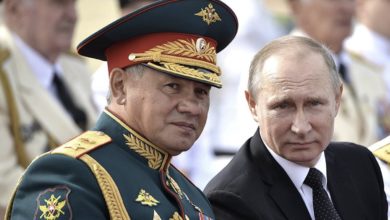The U.S. government has slapped sanctions on companies in Russia and five other countries for exporting military technology to states targeted by Washington. U.S. officials claim the military exports could lead to the development of “weapons of mass destruction.” The United States is by far the leading arms exporter in the world.
|
Washington’s hostile move is the latest escalation in the growing U.S.-Russia conflict, and comes only days after a meeting between top-level U.S. and Russian military officers to tackle some of their issues of contention.
Among those, the recent military confrontation between Russia and the U.S.-backed Georgian state stands out. Russia intervened decisively when Georgia began shelling the region of South Ossetia.
Georgia began to assert its national dominance over other smaller nationalities within its territory in the months prior to the final demise of the Soviet Union. South Ossetians, with strong ties to Russia, have been long demanding independence. By weighing in on the side of the oppressed South Ossetians, Russia’s military intervention played a progressive role.
But is the Russian state progressive? Where does it stand vis-?-vis the United States and other imperialist nations? What is the nature of the U.S.-Russia rift?
A break with the past
Modern-day Russia is the product of the overthrow of the world’s first successful socialist revolution. It is the world’s 11th largest economy by nominal gross domestic product and a major arms exporter. Following the overthrow of the Soviet Union, the capitalist elements who had seized the reins of power have restlessly sought to dissociate themselves from any vestige of their country’s socialist past.
A curious and indicative development illustrates the efforts of the Russian bourgeoisie to effect this break. The Russian Supreme Court recently rehabilitated Czar Nicholas II and his family, deeming the royals victims of Bolshevik “political persecution.”
Nicholas, the last czar of Russia, was overthrown in March 1917 in the first phase of the Russian revolution. A few months after the November 1917 Bolshevik victory, when civil war was raging with the outcome hanging in the balance, Nicholas and his family were executed for crimes against the Russian people, in the case of the czar, and to foreclose any member of the royal family becoming a rallying cause for the counter-revolution.
Nicholas had been a deeply reviled autocratic leader in the eyes of the Russian masses. In 1905, he ordered soldiers to fire live rounds at a peaceful workers’ demonstration outside his palace, sparking the failed 1905 Russian revolution. As World War I ravaged the country, he and his court lived in luxurious opulence while Russia’s vast peasantry and growing working class went hungry. The execution of the royal family was only mourned by those whose power and privilege had been protected by czarist rule.
Why would the Russian state, 90 years later, revise history to rehabilitate an undisputed tyrant? Because the overthrow of Russian czarism is inseparable from the triumph of the workers’ revolution. The modern-day capitalist Russian state has made peace with the monarchy to further discredit the achievements of socialism.
Moscow on the defensive
The swift transition to capitalism following the overthrow of the Soviet Union was a painful one for workers. The dissolution of the USSR translated into unemployment, poverty and the obliteration of social safety nets in both Russia and other former Soviet republics.
Throughout this process, the Russian capitalists have sought to assert their regional influence. Given the historic ties that existed during the socialist period, Russia’s new ruling class aspired to retain as many former Soviet republics as it could within its sphere of influence.
U.S. imperialists and their allies, who had gone to great lengths to break up the USSR, had their own designs in mind for the region. Washington has intervened, both overtly and covertly, to install regimes in the former Soviet republics that would favor U.S. interests. Georgia’s “Rose Revolution” and Ukraine’s “Orange Revolution”—neither of them actual revolutions—stand as prime examples of U.S.-orchestrated political destabilization efforts to install U.S.-friendly regimes at the expense of Russia.
For all its ambitions, capitalist Russia could not be the economic powerhouse that the USSR had been. Centralized economic planning and economic integration between the fifteen Soviet republics were key factors in the USSR’s unparalleled economic growth. The replacement of central planning with “free-market principles” and the national divisions fomented by U.S. imperialism among the former Soviet republics wreaked economic havoc in the region.
Washington’s and Moscow’s regional interests were inherently incompatible. Conflict naturally ensued.
Washington’s maneuvers near Russia’s borders have been a source of particular concern for Moscow. Deployment of missile defense systems in Poland and the Czech Republic, support for NATO membership for Ukraine and Georgia and the arrival of U.S. and NATO ships in the Black Sea are correctly seen as direct threats.
Countries under imperialist siege face a range of hostilities from the U.S. government and its allies, including political pressure, economic sanctions and military threats. Not surprisingly, they often turn to each other to overcome the isolation imposed by the bigggest imperialist power.
Despite the different character of their respective governments, Russia and Venezuela have strengthened their relations in recent years as they both cope with increased U.S. aggression. Trade between Russia and Venezuela doubled to $1.1 billion in 2007. Potential joint ventures include factory construction, nuclear power development and a new energy consortium involving oil and gas production. That program may also expand into Ecuador and Bolivia, both of them regional allies of Venezuela. (New York Times, July 23)
On the military front, the Venezuelan government signed 12 contracts for weapons purchases from Russia between 2005 and 2007. As of July, total weapons sales had reached $4.5 billion, including fighter jets, helicopters, anti-aircraft systems and 100,000 Kalashnikov rifles. According to the Interfax agency, a Russian military source confirmed on Oct. 17 that Venezuela’s government is holding talks to purchase numerous Russian T-72 tanks.
A squadron from the Russian Navy’s North Sea Fleet set sail for Venezuela in September to hold joint military exercises. The convoy included the nuclear-powered guided missile cruiser Peter the Great and the anti-submarine ship Admiral Chabanenko.
For Venezuela’s revolutionary government, economic and military relations with Russia could offer give it an extra edge against the U.S. offensive and help continue its revolutionary development. For capitalist Russia, the partnership brings economic gains and strategic benefits from bolstering another Washington target.
In the current alignment of forces, the Russian bourgeoisie is on the defensive against U.S. imperialism, which explains its opposition to Washington’s regional encroachment.
Like all capitalist countries, Russia’s ruling class is composed of bank heads and corporate owners. Government policy in the country is decided with their interests in mind. The extreme decline in living standards for substantial sectors of the Russian urban and rural working classes is a sign that those in power do not care about the interests of the people. The Russian capitalists’ support for progressive governments in Latin America could quickly be negotiated away for accommodations with Washington should they find that to be in their best interest.
Socialists in the United States have a central obligation to expose the imperialist designs of their “own” government in its effort to demonize, subvert and conquer targeted countries such as Russia. This is the first obligation of socialists, even if Russia’s efforts to resist and block U.S. aggression are based on narrow national interests rather than internationalist socialist solidarity.






